Ad
(3) cpp procedural programming
- 1. 1 Nico Ludwig (@ersatzteilchen) (3) Basics of the C++ Programming Language
- 2. 2 TOC ● (3) Basics of the C++ Programming Language – Procedural Programming – Predefined and User defined Functions – Declaration and Definition of Functions – Procedural and recursive Function Calling – Namespaces and separated Function Definitions – A Glimpse of Separated Compilation and Translation Units ● Sources: – Bruce Eckel, Thinking in C++ Vol I – Bjarne Stroustrup, The C++ Programming Language
- 3. 3 Procedural Programming ● Imperative programming reaches its limits very soon. – It is needed to repeat identical code parts all over in the program. – If a repeated part contains a bug, this bug is present on all occurrences! – We have to copy a code part to reuse it, or to share it with other developers. – In general: Don't Repeat Yourself! DRY – DRY in programming results in the the "Top-Down" approach. ● In engineering, complex problems are getting separated into smaller problems. – In programming, problems are broken into procedures or functions. – We call this the "Bottom-Up" approach, or functional decomposition. ● Procedural programming is all about the "Top-Down" and "Bottom-Up" notions. – Top-Down: Programmers rework their code into functions to make it reusable. – Bottom-Up: Programmers code new functions that solve subproblems. ● Procedural programming extends imperative programming with the concept of (reusable) functions.
- 4. 4 Procedural Programming in C/C++ ● In C/C++, procedural programming is implemented with functions. ● A function is a part of code that can be called independently. – Formerly known as "sub program". – In C/C++ there is no difference between procedures and functions. – In functions, statements can be executed imperatively. – In functions, further functions can be called as well. ● This code style is rather verb-oriented: "do this" and "call that" etc. ● Procedural code in C/C++: – Program execution starts in the function main(), from where other functions are being called. – In fact coding functions is the central activity of C/C++ programmers! ● What is a procedure?
- 5. 5 Using predefined Functions in own Code ● The C/C++ standard library provides a plethora of functions for us. – The C/C++ standards team already had their "Top-Down" specs on... :-) – These functions allow reusing foreign code to solve own problems. – E.g: std::pow(), std::qsort(), std::bsearch(), std::transform() etc. – Some functions open the gate to the OS, like std::system(). ● How to use functions from the standard library? – #include the respective standard h-file, where the function declaration resides. – (Optionally add a using directive for the namespace std.) – Call the standard function within own code. – (Mind to pass the lib file, where the functions' definition resides, to the linker.) ● "There is a problem with the usage of std::system()." What does this statement mean? ● Well, std::system() accepts commands that are highly platform-dependent in most cases.
- 6. 6 Declaration and Definition of Functions int GetCount (int x, int y) { // A block of code (function body). } return 42; Type of returned value or void. Function name Parameter list Function bodyReturn value from function. int GetCount (int x, int y = 0);Declaration: Definition: C++11 – trailing return type auto GetCount(int x, int y) -> int { return 42; } int (*)(int, int) The signature of GetCount. Default argument
- 7. 7 Features of Functions – Returning Values ● Functions can have a return type. – When such a function is called, a value of type "return type" will be returned as a result of that function. – This value can be stored (stuck into a variable) or otherwise consumed. ● Functions w/o return type are declared as returning void instead of a concrete type. – Such functions don't have a result, but a persistent side effect in most cases. ● Functions, which only return values but have no side effects, are sometimes called pure functions. ● When a return statement in a function is executed (w/ or w/o returning a value) a function will beexited immediately! // Store the returned value in a variable... (Mind that we have to write a pair of empty // parentheses, as GetDayOfMonth() accepts no parameters.): int day = GetDayOfMonth(); // …or use it in an expression: std::cout<<"The day is: "<<GetDayOfMonth()<<std::endl; // Finally the function can be called, ignoring the result: GetDayOfMonth(); // On calling ClearScreen(), the side effect happens, then ClearScreen() returns. ClearScreen(); // However, ClearScreen dos not return a value we could process! // A function, which returns an int. int GetDayOfMonth() { // pass } // Clears the screen as side effect, // but doesn't return a value. void ClearScreen() { // pass }
- 8. 8 Features of Functions – Parameters ● The return type, the parameter types and the order of parameters make up the signature of a function. ● Function definition and declaration can have an optional list of parameters (params). – A parameter is a function's variable storing the value of the passed argument. – A set of functions can have the same name, but differ in the signature's parameter list. ● This handy feature is what we call "function overloading". – The last items of the parameter list can be prepared with default arguments or build a variable argument list. ● On calling a function a list of arguments will be passed to satisfy the params. – If a function requires no parameters, an empty pair of parentheses is written. – Order and type of the arguments must match to the parameters respectively. ● By this matching, the correct (overloaded) function will be found. ● A matching (overloaded) function is resolved at compile time! – Parameters having a default argument, need not to be "satisfied". – Arguments are passed by value by default, so parameters contain copies of the arguments. ● It is not possible to overload return types! ● Btw. selecting function overloads at run time can also be implemented in C++ with so called "multiple dispatch". ● What is the difference between arguments and parameters? ● A parameter is nothing but a local variable that contains the value of the respective argument. Or: an argument is the initial value of the respective parameter. ● The passed argument expressions are evaluated in an unpredictable order!
- 9. 9 Features of Functions – Calling Functions in a Nutshell // No return type, no parameter list. void clearScreen() { // pass } // Call clearScreen() (mind the pair of empty parentheses), clearScreen() should // perform a side effect. clearScreen(); // No return type, awaits an int parameter. void checkAccount(int accountId) { // pass } // Call checkAccount(), pass 42 as argument. checkAccount(42); // Returns int, awaits an int parameter. int getEntry(int entryID) { // pass } // Call getEntry(), pass 4 as argument, store the returned result in the variable theEntry. int theEntry = getEntry(4); // Returns int, awaits two int parameters. int GetValue(int trackId, int index = 0) { // pass } // Call GetValue(), pass 7 (trackId) and then 7 (trackId) and 4 (index). Result ignored. GetValue(7); // The parameter index defaults to 0. GetValue(7, 4); // Both parameters are being satisfied.
- 10. 10 Functions are called – there is no Code Replacement ● A common misunderstanding: function call leads to "code replacement". – This is not what's going on! ● The functions A() and B() do always exist, their code is not "merged" somehow. ● Functions are rather procedurally called in C/C++. ● (Code replacement can be achieved with macros in C/C++.) int A() { return 2 + 3; } void B() { int result = A(); std::cout<<result<<std::endl; } void B() { int result = 2 + 3; // No! std::cout<<result<<std::endl; }NO!B() calls A() ● There is no code replacement going on, it would lead to code bloat, and thus bigger executables after compilation.
- 11. 11 Procedural Calling of Functions ● And again: functions can call other functions. – When a function completes, execution returns to where the function was called from. – "Top-level" functions call "lower-level" functions. So, there is a call hierarchy. int main(int argc, char* argv[]) { double result = Square(3); } #include <cmath> double Square(double arg) { return std::pow(arg, 2); } namespace std { double pow(double b, double exp) { // calculate the pow return value; } }result = 9 (3) (3, 2) 9 9
- 12. 12 Recursive Calling of Functions ● Some problems can be described as smaller instances of the same problem. – In maths such descriptions are called recursive descriptions. – For example the factorial function (1 x 2 x 3 x 4 … x n): ● Factorial can be expressed as a recursive function in C/C++. – In maths, recursion means that a equation is defined in terms of itself. – In programming, recursion means that a function calls itself. ● How to write a recursive function? – A subproblem of the whole problem must be used as argument for recursive calls. – And it is needed to consider the base case, when the recursion terminates! – (The progression of the recursive calls must tend to the base case.) – If we fail to consider one of these cases, we may end with an infinite recursion! n!= {1; n=0 n((n−1)!); n>0 n∈N ● Where to use the "factorial" function? ● E.g. the factorial is used to calculate the count of permutations of a set of elements. ● Infinite recursions run as long as all the stack memory of the executing thread is exhausted.
- 13. 13 Recursive Calling in Action int main(int argc, char* argv[]) { int result = Factorial(3); } int Factorial(int n) { if (0 == n) { return 1; } else { return n * Factorial(n – 1); } } int Factorial(int n) { if (0 == n) { return 1; } else { return n * Factorial(n – 1); } } (3) (2) 6 2 int Factorial(int n) { if (0 == n) { return 1; } else { return n * Factorial(n – 1); } } (1) 1 int Factorial(int n) { if (0 == n) { return 1; } else { return n * Factorial(n – 1); } } (0) 1 0 == n result = 6 ● In the beginning, recursion is difficult to understand for most people. - They think about all the calls of a recursive function, in order to understand, if it is correct or not. They rather understand a function as a "machine" that processes inputs and returns outputs. → A better way to understand a function is that a function is a process. E.g. "process all documents and process all documents referred to in these documents".
- 14. 14 Various Implementations of the Factorial Algorithm int FactorialRecursive(int n) { if (0 == n) { return 1; } else { return n * FactorialRecursive(n – 1); } } int FactorialIterative(int n) { int result = 1; for (int i = n; i > 0; --i) { result *= i; } return result; } int FactorialNiceRecursive(int n) { return (0 == n) ? 1 : n * FactorialNiceRecursive(n - 1); } n!= {1; n=0 n((n−1)!); n>0 n∈N
- 15. 15 Recursion and Recursive Functions in the Wild ● Useful to operate on recursive data. -> Data trees! – E.g. a TreeView contains trees, that contain subtrees, that contain subtrees... – Xml data is also a cascading tree of trees. – Directory and file hierarchies. – Network analyses, e.g. calculation of network efficiency and network load. ● Complex problems and puzzles can be solved easily with recursion. – Maths: permutations of a set, numeric differentiation/integration – Games: Towers of Hanoi, Sudoku, Chess puzzles etc. ● Definition of subproblems to be solved by multiple CPUs independently. – The idea is to use CPU resources most efficiently -> Divide and conquer! – Filters in graphics programming. – Data analyses in networks and databases.
- 16. 16 Organizing Functions in Namespaces ● So far all user defined functions we saw, were defined as global functions. ● Global functions may clash with equally named/typed other functions. – The functions of the standard library reside in the namespace std to prevent this. ● Also do namespaces group free functions semantically. – It turns out, that all free functions should reside in namespaces! – Don't define global functions (save main()), use namespaces instead! ● C++ namespaces can be understood as directories and functions as files. – In a file system directories do contain files. – Files with the same name can reside in different directories. -> No clash! ● Let's examine how to define and use namespaces with the function Factorial()... ● What's a free function? ● And what is its opposite?
- 17. 17 // Function Factorial in the namespace Nico: namespace Nico { int Factorial(int n) { return (0 == n) ? 1 : n * Factorial(n - 1); } } Defining and using Namespaces in Code // 1. Alternative: Qualify the function name // with the namespace's name: int main(int arc, char* argv[]) { int result = Nico::Factorial(3); return EXIT_SUCCESS; } // 2. Alternative: Make all functions // in the namespace Nico global: with a // using directive: using namespace Nico; int main(int arc, char* argv[]) { int result = Factorial(3); return EXIT_SUCCESS; } // 3. Alternative: Make only functions // named Nico::Factorial global: with // a using declaration: using Nico::Factorial; int main(int arc, char* argv[]) { int result = Factorial(3); return EXIT_SUCCESS; } ● Mind that namespaces allow us to have any other function named Factorial() residing in any other namespace than Nico; they will not clash with Nico::Factorial()!
- 18. 18 Separated Function Definitions ● Related functions should be implemented in separate code files. - Why that? – Each developer can manage just his functions, not interfering with others'. – On modification, just the separately modified code files must be compiled. – Very important: The implemented code can be hidden from its callers. ● Separate and collect function definitions. - What's to do? – Collect related function definitions in own cpp/c-files (summarized "c-files", these are the code files). – Create h-files with function declarations for the functions in the c-files respectively. – These "matching" h- and c-files should have the same name. ● The file names should not contain whitespaces or special characters (like umlauts). – As C/C++ convention, #include the h-files into the belonging cpp/c-files. ● Calling the separated functions. - What's to do? – In our top-level code file, we've to #include the h-files declaring the functions we need. – In the code we can call the functions, because the declarations are visible. ● So far the calling side of functions are discussed. But what's about the function definitions? Where do they reside? => Now we'll inspect translation units.
- 19. 19 Documentation of Function Declarations ● The separation of function declaration and definition leads to information loss. – In some sense this was the aim (callers should not see the definitions). – But the mere function declaration is very opaque to us. ● How to improve the situation? – Self description: Choose meaningful function and parameter names. – Add documentation/usage comments to function declarations. // numeric.h namespace Nico { /// Calculates the factorial. /// @param arg – the positive value to calculate the factorial from. /// @return – the factorial result. int Factorial(int arg); }
- 20. 20 Creation of the Translation Unit by the Preprocessor // numeric.h namespace Nico { /// Calculates the factorial. /// @param arg – the positive value /// to calculate the factorial from. /// @return – the factorial result. int Factorial(int arg); } // Main.cpp #include "numeric.h" int main(int arc, char* argv[]) { int result = Nico::Factorial(3); return EXIT_SUCCESS; } // Main.cpp tu namespace Nico { int Factorial(int arg); } int main(int arc, char* argv[]) { int result = Nico::Factorial(3); return EXIT_SUCCESS; } // numeric.cpp #include "numeric.h" namespace Nico { int Factorial(int n) { return (0 == n) ? 1 : n * Factorial(n - 1); } }
- 21. 21 Separated Compilation and Linkage ● The separated c-files with function definitions need to be compiled also! – In simple projects, we'll only have one code file (with the definition of main()). – But in multi-file-projects we need to tell the compiler to compile all! – Also the linker has to link all the resulting object-files (o-files) to an executable. ● How to negotiate with the compiler and linker about multiple files? – We can, however, compile all c-files separately, e.g. on the console. – We can write a make file that defines the build-tasks for compiler and linker. – => In the end it is recommended to use an IDE to define this stuff in a project. ● Ok! What does a project within an IDE do for us? – In the project we'll just collect all the h/c-files (and other files) we require. – The IDE project will be automatically updated, when we add/remove h/c-files. – Compiler and linker will be automatically prepared to deal with all the project's files. ● What other kinds of files could be managed within a IDE project? ● E.g. resource files like icons.
- 22. 22 Getting our Feet wet with IDE Projects and Functions ● Example – Decompose a problem: – Often the function call std::system("pause") is used to wait for the user on console. – Possibly this function call should be used by other programs as well. – That solution is Windows only! It should be expressed by platform neutral means. – Let us extract this into our own function the "Bottom-Up" way! → Call it Wait(). – We should put this new function into its own namespace! – Implement with std::system("pause") and test it. – Then implement it in a platform neutral fashion and test it again. – => Decomposition complete! ● What does to function call std::system("pause") do (std::system() is declared in <cstdlib>)? ● Why is this solution Windows only?
- 23. 23 Thank you!
Editor's Notes
- #5: What is a procedure?
- #6: &quot;There is a problem with the usage of std::system().&quot; What does this statement mean? Well, std::system() accepts commands that are highly platform-dependent in most cases.
- #9: It is not possible to overload return types! Btw. selecting function overloads at run time can also be implemented in C++ with so called &quot;multiple dispatch&quot;. What is the difference between arguments and parameters? A parameter is nothing but a local variable that contains the value of the respective argument. Or: an argument is the initial value of the respective parameter. The passed argument expressions are evaluated in an unpredictable order!
- #11: There is no code replacement going on, it would lead to code bloat, and thus bigger executables after compilation.
- #13: Where to use the &quot;factorial&quot; function? E.g. the factorial is used to calculate the count of permutations of a set of elements. Infinite recursions run as long as all the stack memory of the executing thread is exhausted.
- #14: In the beginning, recursion is difficult to understand for most people. - They think about all the calls of a recursive function, in order to understand, if it is correct or not. They rather understand a function as a &quot;machine&quot; that processes inputs and returns outputs. → A better way to understand a function is that a function is a process. E.g. &quot;process all documents and process all documents referred to in these documents&quot;.
- #17: What&apos;s a free function? And what is its opposite?
- #18: Mind that namespaces allow us to have any other function named Factorial() residing in any other namespace than Nico; they will not clash with Nico::Factorial()!
- #19: So far the calling side of functions are discussed. But what&apos;s about the function definitions? Where do they reside? =&gt; Now we&apos;ll inspect translation units.
- #22: What other kinds of files could be managed within a IDE project? E.g. resource files like icons.
- #23: What does to function call std::system(&quot;pause&quot;) do (std::system() is declared in &lt;cstdlib&gt;)? Why is this solution Windows only?


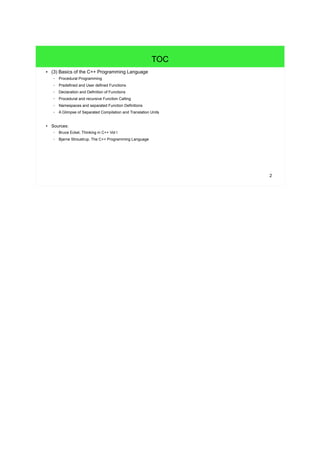
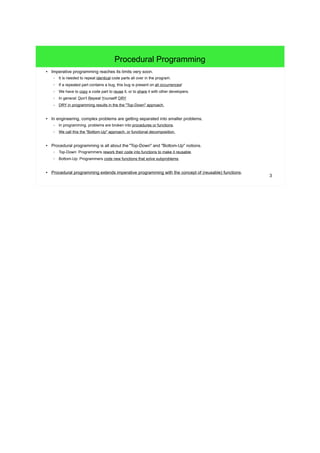
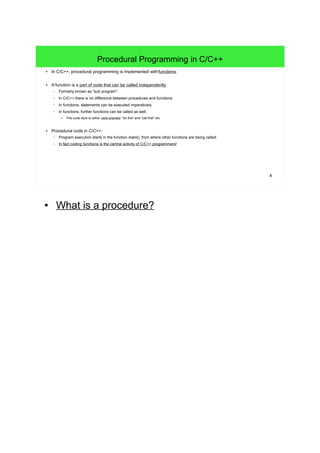

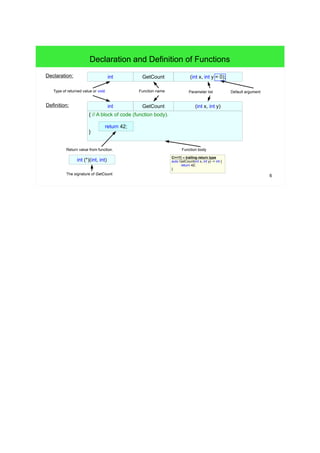




![11
Procedural Calling of Functions
● And again: functions can call other functions.
– When a function completes, execution returns to where the function was called from.
– "Top-level" functions call "lower-level" functions. So, there is a call hierarchy.
int main(int argc, char* argv[]) {
double result = Square(3);
}
#include <cmath>
double Square(double arg) {
return std::pow(arg, 2);
}
namespace std {
double pow(double b, double exp) {
// calculate the pow
return value;
}
}result = 9
(3)
(3, 2)
9
9](https://image.slidesharecdn.com/3cppproceduralprogramming-140829145538-phpapp02/85/3-cpp-procedural-programming-11-320.jpg)
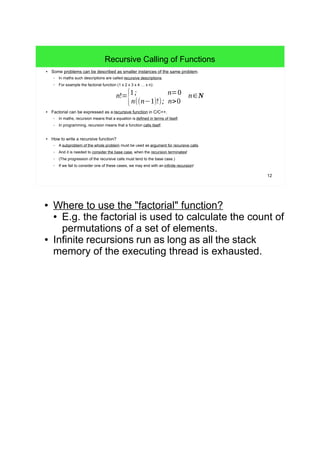
![13
Recursive Calling in Action
int main(int argc, char* argv[]) {
int result = Factorial(3);
}
int Factorial(int n) {
if (0 == n) {
return 1;
} else {
return n * Factorial(n – 1);
}
}
int Factorial(int n) {
if (0 == n) {
return 1;
} else {
return n * Factorial(n – 1);
}
}
(3)
(2)
6
2
int Factorial(int n) {
if (0 == n) {
return 1;
} else {
return n * Factorial(n – 1);
}
}
(1)
1
int Factorial(int n) {
if (0 == n) {
return 1;
} else {
return n * Factorial(n – 1);
}
}
(0)
1
0 == n
result = 6
● In the beginning, recursion is difficult to
understand for most people. - They think about all
the calls of a recursive function, in order to
understand, if it is correct or not. They rather
understand a function as a "machine" that
processes inputs and returns outputs. → A better
way to understand a function is that a function is
a process. E.g. "process all documents and
process all documents referred to in these
documents".](https://image.slidesharecdn.com/3cppproceduralprogramming-140829145538-phpapp02/85/3-cpp-procedural-programming-13-320.jpg)

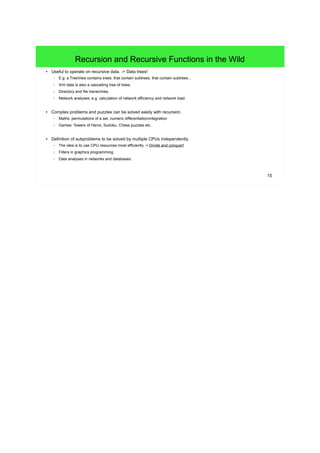
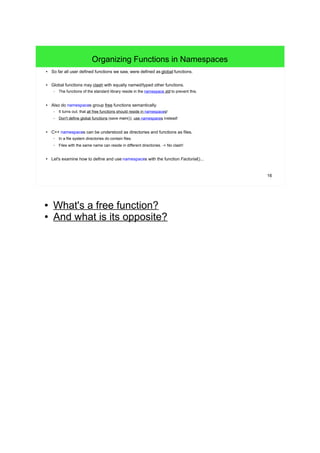
![17
// Function Factorial in the namespace Nico:
namespace Nico {
int Factorial(int n) {
return (0 == n)
? 1
: n * Factorial(n - 1);
}
}
Defining and using Namespaces in Code
// 1. Alternative: Qualify the function name
// with the namespace's name:
int main(int arc, char* argv[]) {
int result = Nico::Factorial(3);
return EXIT_SUCCESS;
}
// 2. Alternative: Make all functions
// in the namespace Nico global: with a
// using directive:
using namespace Nico;
int main(int arc, char* argv[]) {
int result = Factorial(3);
return EXIT_SUCCESS;
}
// 3. Alternative: Make only functions
// named Nico::Factorial global: with
// a using declaration:
using Nico::Factorial;
int main(int arc, char* argv[]) {
int result = Factorial(3);
return EXIT_SUCCESS;
}
● Mind that namespaces allow us to have any other
function named Factorial() residing in any other
namespace than Nico; they will not clash with
Nico::Factorial()!](https://image.slidesharecdn.com/3cppproceduralprogramming-140829145538-phpapp02/85/3-cpp-procedural-programming-17-320.jpg)

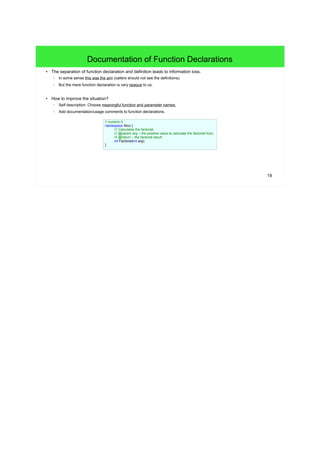
![20
Creation of the Translation Unit by the Preprocessor
// numeric.h
namespace Nico {
/// Calculates the factorial.
/// @param arg – the positive value
/// to calculate the factorial from.
/// @return – the factorial result.
int Factorial(int arg);
}
// Main.cpp
#include "numeric.h"
int main(int arc, char* argv[]) {
int result = Nico::Factorial(3);
return EXIT_SUCCESS;
}
// Main.cpp tu
namespace Nico {
int Factorial(int arg);
}
int main(int arc, char* argv[]) {
int result = Nico::Factorial(3);
return EXIT_SUCCESS;
}
// numeric.cpp
#include "numeric.h"
namespace Nico {
int Factorial(int n) {
return (0 == n)
? 1
: n * Factorial(n - 1);
}
}](https://image.slidesharecdn.com/3cppproceduralprogramming-140829145538-phpapp02/85/3-cpp-procedural-programming-20-320.jpg)
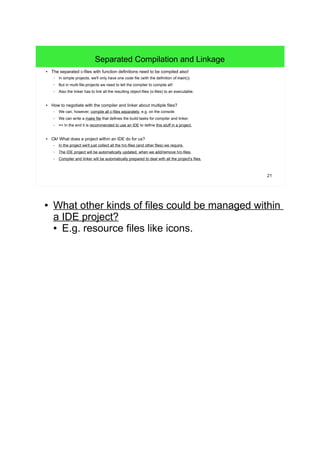
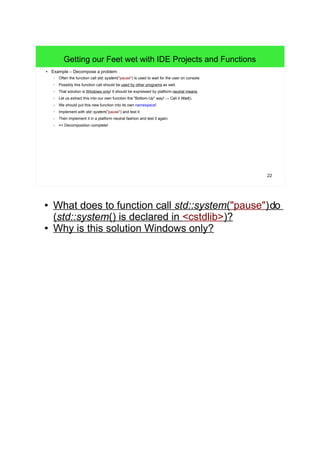





























































![Chapter_1.__Functions_in_C++[1].pdf](https://cdn.slidesharecdn.com/ss_thumbnails/chapter1-230901115452-13a8ca1c-thumbnail.jpg?width=560&fit=bounds)














































